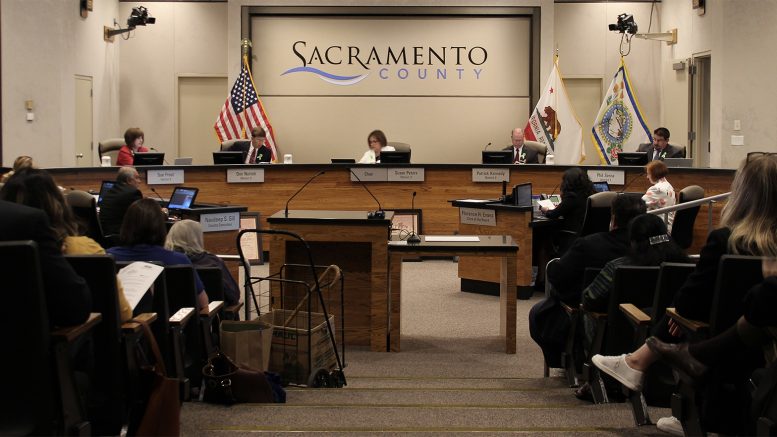Editor’s note: Budget challenges for Sacramento County go way beyond the calls to defund the Sheriff’s Office
The revised 2020-21 budget approved by Sacramento County supervisors certainly didn’t satisfy those pushing to defund law enforcement.
The decisions made by supervisors also set themselves up for even tougher spending choices next year, particularly if the coronavirus recession continues and no more federal aid arrives.
While county officials say the budget addresses the COVID-19 pandemic, avoids significant cuts to critical programs and meets some urgent needs, they also say it buys time for the economy—and tax receipts—to recover.
The budget is only balanced—making up for $170 million in revenue losses—by using $226 million in one-time state and federal funds that won’t be available for the next budget.
And that isn’t the only challenge.
All 26 contracts with 30 employee bargaining units expire by next July, so salary and benefit costs are likely to rise. The county may have to put more money into its $9.8 billion pension system that covers 12,700 workers and 12,400 retirees. And there’s a $105 million judgment against the county—and this one doesn’t involve the Sheriff’s Office, perennially the subject of most claims of any county agency.
Instead, the case concerns a gravel mine operated by Joseph Hardesty on land he leased from Jay Schneider near the Cosumnes River. The business started in 1980 and as it expanded through the years, complaints from neighbors increased.
So did county scrutiny. The county says it wasn’t trying to close the mine, but only make it follow new environmental rules.
But Hardesty shut down the mine, Schneider couldn’t find another tenant and the two sued, claiming in part that county officials were trying to help rival Teichert Construction Co.
In March 2017, a federal jury decided the county had acted arbitrarily and violated the men’s rights, and awarded $75 million to Hardesty and $30 million to the Schneider family for past and future business losses. In 2018, a federal district court judge upheld the judgment.
In a January hearing before the Ninth Circuit U.S. Court of Appeals, lawyers for the county said the business losses are vastly overstated and the award should be reduced.
So that’s hanging over the county’s head.
And the local Defund the Police movement isn’t going anywhere, either.
Supervisors approved the budget Sept. 10 after hearing from people on both sides of whether to reduce funding to the Sheriff’s Office and use the money instead for human services and violence prevention. The board took no significant action on shifting money from the sheriff; the general fund budget actually gives the sheriff an additional $38 million, a 7% increase.
Supervisor Susan Peters let her constituents know Friday that the Sheriff’s Office had been fully funded. “Reducing the Sheriff’s budget or ‘defunding’ would compromise the safety of our families, businesses, and property located in the unincorporated area,” she wrote. “I could not support that and have not in all my time in office.”
Supervisors, however, did direct staff to report back within 45 days on how to expand the Mobile Crisis Support Team, which partners behavioral health workers and sheriff’s deputies to respond to emergency calls involving people in mental health crisis.
Supervisors also signed off on $2.1 million to start equipping deputies and park rangers with body-worn cameras, and added $957,446 to also equip probation officers. And they agreed to set aside $9.4 million for a consent decree that requires improvement to jail conditions.






Be the first to comment on "Buying time"